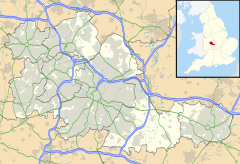Castle Bromwich
| Castle Bromwich | |
|---|---|
| Castle Bromwich shown within the West Midlands | |
| Population | 11,217 (2011.Ward) |
| OS grid reference | SP145897 |
| • London | 115.7 mi (186.2 km) |
| Civil parish |
|
| Metropolitan borough | |
| Metropolitan county | |
| Region | |
| Country | England |
| Sovereign state | United Kingdom |
| Post town | BIRMINGHAM |
| Postcode district | B36 |
| Dialling code | 0121 |
| Police | West Midlands |
| Fire | West Midlands |
| Ambulance | West Midlands |
| EU Parliament | West Midlands |
| UK Parliament | |
Castle Bromwich (/brɒmɪtʃ/) is a suburb situated within the northern part of the Metropolitan Borough of Solihull in the English county of the West Midlands. It is bordered by the rest of the borough to the south east, North Warwickshire to the east and north east; also Shard End to the south west, Castle Vale, Erdington and Minworth to the north and Hodge Hill to the west – all areas of the City of Birmingham. It constitutes a civil parish which had a population of 11,857 according to the 2001 census, falling to 11,217 at the 2011 census.
It was a civil parish within the Meriden Rural District of Warwickshire until the Local Government Act 1972 came into force in 1974, when it became part of Solihull.
In 1861, the population was 613. This rose to just over 1,000 in the 1920s, when half of the original parish was ceded to the City of Birmingham for the construction of overspill estates. This caused a drop to 678 (almost the 1861 level). Post Second World War estate building in Castle Bromwich increased the population to 4,356 in 1951, 9,205 in 1961 and 15,941 in 1971. The parish was then split into two, resulting in the lower 2001 figures.
Castle Bromwich was originally a Warwickshire village. There has been a settlement here since before Stone Age times. There is evidence that the area was first settled some 5,000 years ago. Romans, Saxons and Normans have also settled on this raised piece of land close to a natural ford across the river Tame. The Chester Road which runs through the village follows the line of a drovers' road called the Welsh Road, whose origins probably lie as an ancient trackway from the pre-Roman era. Bromwich is not named in the Domesday Book in 1086 yet was located within the ancient hundred of Coleshill. Bromwich comes from the old words 'brom' for the yellow flowering broom which grows here and 'wich' an ancient name for a dwelling or settlement. The motte (called the Pimple Hill locally) is some 40 metres in diameter and appears to be a natural feature that was probably heightened by Iron Age settlers, then by the later Normans and once again during the developed of the 1970s to make way for the A452 "Collector Road", which by-passed Castle Bromwich to the north.
...
Wikipedia

